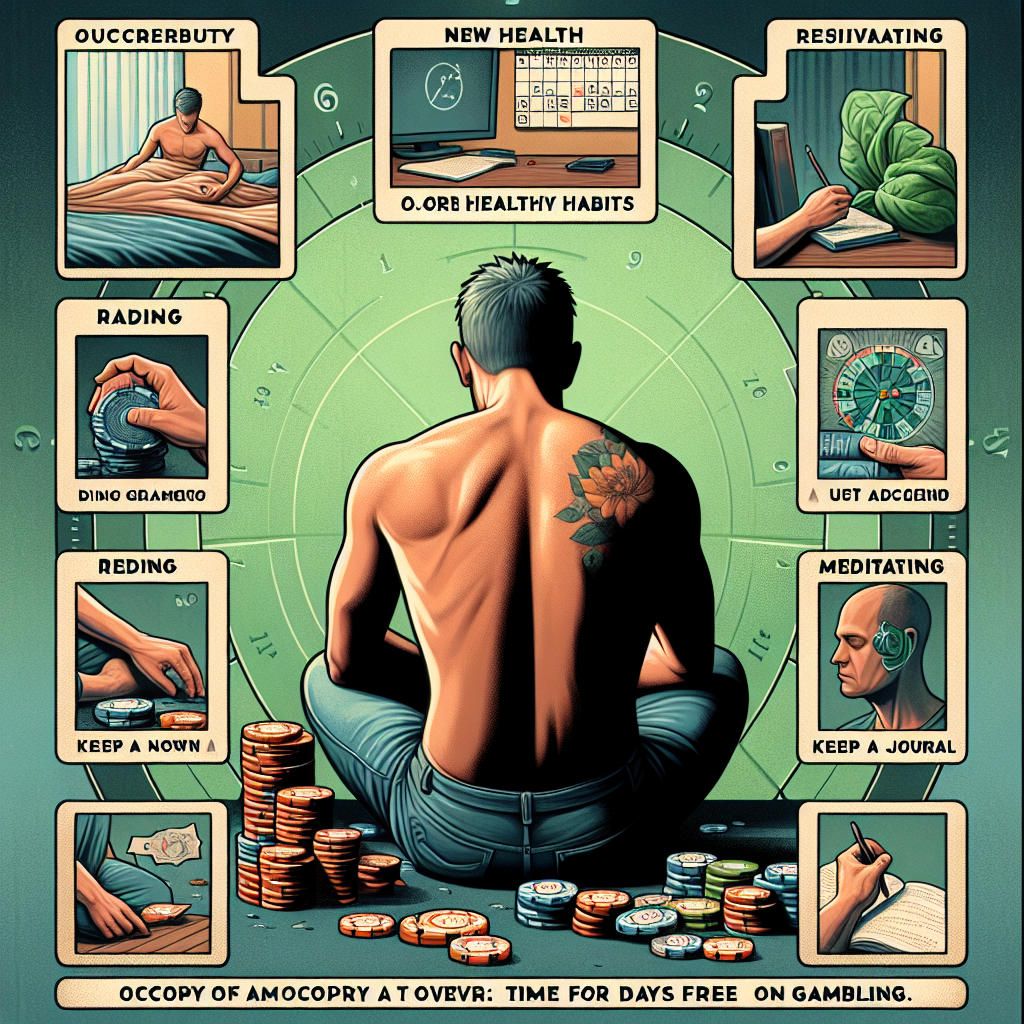-
Table of Contents

“Breaking Free: Overcoming Gambling Addiction Solo”
Introduction
Gambling addiction, a serious and often debilitating condition, can have profound impacts on an individual’s financial stability, relationships, and overall well-being. The journey to recovery from gambling addiction is complex and multifaceted, raising the question of whether it is possible to achieve recovery alone. While some individuals may find success through self-help strategies and personal determination, the path to overcoming gambling addiction typically benefits from a combination of professional support, peer groups, and a strong personal support network. Understanding the challenges and resources available is crucial for anyone seeking to reclaim control over their life from the grips of gambling addiction.
The Challenges Of Achieving Gambling Addiction Recovery Alone
Achieving gambling addiction recovery alone is a daunting challenge, yet it is not entirely impossible. The journey to recovery is often fraught with numerous obstacles, and the path can be incredibly lonely. However, understanding the complexities of gambling addiction and the inherent difficulties in tackling it solo can provide valuable insights and perhaps inspire those struggling to seek the help they need.
Gambling addiction, much like other forms of addiction, is a multifaceted issue that affects not only the individual but also their loved ones. The compulsive nature of gambling can lead to severe financial, emotional, and psychological consequences. When attempting to recover alone, the first significant challenge is acknowledging the problem. Denial is a common trait among those with gambling addiction, and without external intervention, it can be challenging to break through this barrier. Self-awareness is crucial, but it often requires a level of introspection that can be difficult to achieve without guidance.
Once the problem is acknowledged, the next hurdle is developing a plan for recovery. This involves identifying triggers, understanding the underlying causes of the addiction, and finding ways to cope with urges. For someone attempting this alone, the lack of professional support can make it difficult to create an effective strategy. Therapists and counselors are trained to help individuals navigate these complexities, offering tools and techniques that are not easily accessible to those going it alone.
Moreover, the emotional toll of gambling addiction cannot be underestimated. Feelings of shame, guilt, and isolation are common, and these emotions can be overwhelming. Without a support system, it is easy to succumb to these negative feelings, which can lead to relapse. Support groups, whether in-person or online, provide a sense of community and understanding that is invaluable during the recovery process. They offer a space where individuals can share their experiences, gain insights from others, and feel less alone in their struggle.
Another significant challenge is maintaining motivation and accountability. Recovery is a long-term process that requires consistent effort and dedication. When attempting to recover alone, it is easy to lose motivation, especially during difficult times. Having someone to hold you accountable, whether it is a friend, family member, or therapist, can make a substantial difference. They can provide encouragement, celebrate milestones, and help you stay on track.
Financial recovery is another critical aspect that can be particularly challenging to manage alone. Gambling addiction often leads to significant financial problems, and addressing these issues requires careful planning and discipline. Financial counseling can provide the necessary tools and strategies to manage debt, create a budget, and rebuild financial stability. Without this support, the stress of financial recovery can be overwhelming and may hinder overall progress.
Despite these challenges, it is essential to recognize that recovery is possible. The journey may be more difficult without external support, but it is not insurmountable. Self-help resources, such as books, online forums, and educational materials, can provide valuable information and guidance. Developing healthy habits, such as regular exercise, mindfulness practices, and engaging in hobbies, can also support recovery efforts.
In conclusion, while achieving gambling addiction recovery alone presents significant challenges, it is not beyond reach. Acknowledging the problem, developing a comprehensive recovery plan, managing emotional and financial stress, and maintaining motivation are all critical components of the process. However, seeking support from professionals, support groups, and loved ones can significantly enhance the chances of successful recovery. Remember, reaching out for help is not a sign of weakness but a courageous step towards reclaiming control over your life.
Strategies For Self-Help In Gambling Addiction Recovery
Recovering from gambling addiction is a challenging journey, but it is not an insurmountable one. Many individuals wonder if they can achieve gambling addiction recovery alone, and while professional help is often recommended, there are several self-help strategies that can significantly aid in the recovery process. Understanding and implementing these strategies can empower individuals to take control of their lives and work towards a healthier, addiction-free future.
First and foremost, acknowledging the problem is a crucial step. Self-awareness is the foundation of any recovery process. By recognizing the detrimental impact gambling has on one’s life, individuals can begin to take proactive steps towards change. This self-realization often involves reflecting on the emotional, financial, and relational tolls that gambling has exacted. Once the problem is acknowledged, setting clear and realistic goals becomes essential. These goals should be specific, measurable, and attainable, providing a roadmap for the recovery journey.
In addition to goal-setting, developing a strong support system is vital. While the journey may be undertaken alone, it does not mean one has to be isolated. Reaching out to trusted friends and family members can provide emotional support and accountability. Sharing one’s struggles and progress with loved ones can create a sense of community and reduce feelings of loneliness. Moreover, joining support groups, either in-person or online, can connect individuals with others who are facing similar challenges. These groups offer a platform to share experiences, gain insights, and receive encouragement from those who understand the complexities of gambling addiction.
Another effective strategy is to identify and avoid triggers. Triggers are situations, emotions, or environments that prompt the urge to gamble. By recognizing these triggers, individuals can develop coping mechanisms to manage them. For instance, if stress is a trigger, engaging in stress-relief activities such as exercise, meditation, or hobbies can be beneficial. Additionally, avoiding places or events associated with gambling can help reduce temptation. Creating a structured daily routine can also provide stability and minimize opportunities for gambling.
Financial management is another critical aspect of self-help in gambling addiction recovery. Gambling often leads to significant financial strain, and addressing this issue is essential for long-term recovery. Creating a budget, tracking expenses, and seeking financial counseling can help individuals regain control over their finances. It may also be helpful to limit access to money by using prepaid cards or having a trusted person manage finances temporarily. By taking these steps, individuals can reduce the financial stress that often fuels the urge to gamble.
Furthermore, focusing on personal well-being is paramount. Physical health, mental health, and emotional well-being are interconnected, and neglecting any of these areas can hinder recovery. Regular exercise, a balanced diet, and sufficient sleep contribute to overall health and resilience. Additionally, seeking therapy or counseling can provide tools to address underlying issues that may contribute to gambling addiction, such as anxiety, depression, or trauma. Mindfulness practices, such as meditation and deep-breathing exercises, can also help individuals stay grounded and manage cravings.
Lastly, celebrating small victories is essential for maintaining motivation. Recovery is a gradual process, and acknowledging progress, no matter how small, can boost confidence and reinforce positive behavior. Keeping a journal to document achievements and reflect on the journey can serve as a powerful reminder of how far one has come.
In conclusion, while professional help is invaluable, it is possible to achieve gambling addiction recovery alone by employing self-help strategies. By acknowledging the problem, building a support system, identifying triggers, managing finances, focusing on well-being, and celebrating progress, individuals can take meaningful steps towards a healthier, addiction-free life. The journey may be challenging, but with determination and the right strategies, recovery is within reach.
Q&A
1. Is it possible to achieve gambling addiction recovery alone?
– Yes, it is possible to achieve gambling addiction recovery alone, but it can be very challenging without support.
2. What are some self-help strategies for gambling addiction recovery?
– Self-help strategies include setting strict limits on gambling, avoiding triggers, seeking alternative activities, and educating oneself about the risks and consequences of gambling.
Conclusion
While it is possible for some individuals to achieve gambling addiction recovery alone, it is generally more effective and sustainable to seek professional help and support from counseling, support groups, and treatment programs. These resources provide structured guidance, coping strategies, and a supportive community, which can significantly enhance the chances of successful recovery.



